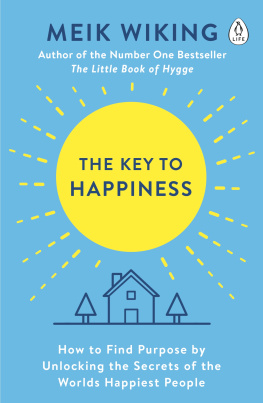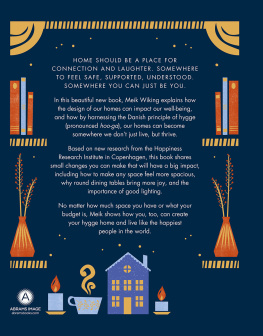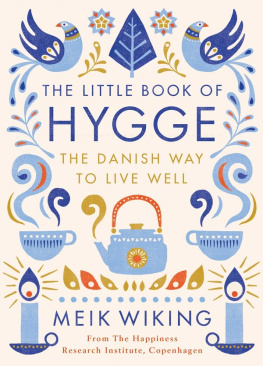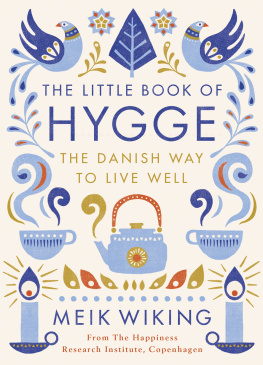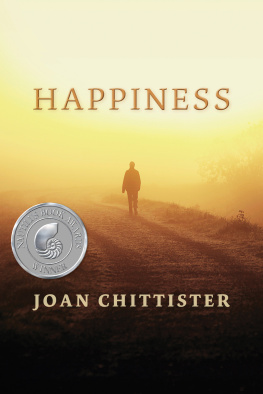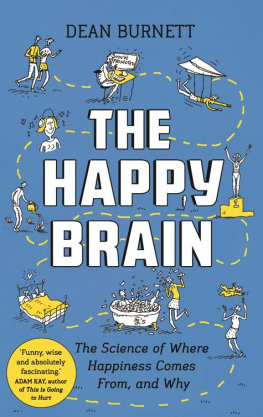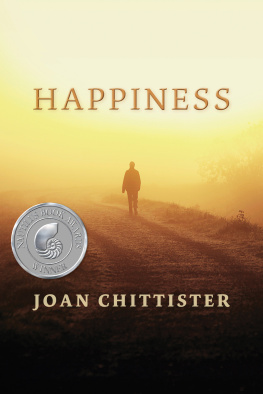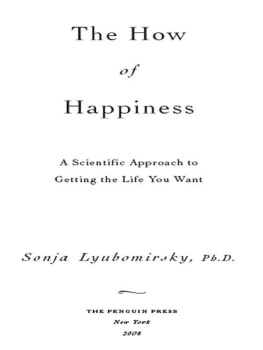About the Author
Meik Wiking has been described by The Times as the happiest man in the world. Hes a leading voice in the field of self-help/personal development. He founded the worlds first Happiness Research Institute in 2011, in Copenhagen, Denmark and he is part of the advisory group to the Global Happiness Policy Report.
He consults cities, governments and organisations around the world on happiness, and has worked with the Minister of State for Happiness in the UAE, the state of Jalisco in Mexico and the city of Goyang in South Korea, among others. He holds a degree in business and political science and previously worked for the Danish Ministry of Foreign Affairs.
When hes not studying political science and writing several books (including The Little Book of Hygge, which has sold over half a million copies worldwide) and reports on happiness, wellbeing and quality of life, he enjoys photography and playing tennis (quite badly) with friends.
Instagram @meikwiking
Twitter @meikwiking
Facebook @meikwiking1
Meik Wiking
THE KEY TO HAPPINESS
How to Find Purpose by Unlocking the Secrets of the Worlds Happiest People

PENGUIN LIFE
UK | USA | Canada | Ireland | Australia
India | New Zealand | South Africa
Penguin Life is part of the Penguin Random House group of companies whose addresses can be found at global.penguinrandomhouse.com

First published as The Little Book of Lykke 2017
This edition published 2019
Copyright Meik Wiking, 2017
The moral right of the author has been asserted
Quote from The Two Towers by J.R.R. Tolkien the Tolkien Estate Limited, 1954, 1955, 1966. Reprinted by permission of HarperCollins Publishers Ltd.
Text design by Francisca Monteiro,
based on the original concept by Hampton Associates
ISBN: 978-0-241-36843-5
This ebook is copyright material and must not be copied, reproduced, transferred, distributed, leased, licensed or publicly performed or used in any way except as specifically permitted in writing by the publishers, as allowed under the terms and conditions under which it was purchased or as strictly permitted by applicable copyright law. Any unauthorized distribution or use of this text may be a direct infringement of the authors and publishers rights and those responsible may be liable in law accordingly.

Chapter One
THE TREASURE HUNT
THE TREASURE HUNT
What are we holding on to, Sam?
That theres some good in this world, Mr Frodo. And its worth fighting for.
Like Tolkien, Hemingway once wrote that the world is a fine place and worth fighting for. These days, it is easier to notice the fighting rather than what is fine. It is easy to point towards the grey skies and dark clouds, but perhaps we all need to be more like Samwise the Stout-hearted (but preferably a bit less furry in the feet department) and see what is good in this world of ours.
A friend of mine, Rita, grew up in Latvia during the Soviet era. It may not have been Mordor, but it was a time of fear and mistrust, a time when every window was covered with a curtain and when communities were shaped by suspicion and scarcity. Occasionally, a truck carrying bananas would arrive from Vietnam. Not knowing when bananas would be available again, my friend and her family would buy as many as they could afford and could carry.
Then the waiting would begin, as the bananas would still be green and not ready to eat. They would place the fruit in a dark cabinet to make it ripen faster. Watching bananas turn from green to yellow was like magic in a city that was fifty shades of grey. As a child, Rita had thought only three colours existed: black, grey and brown. Her dad decided to change that and he took her on a treasure hunt around the city: to look for colour, for beauty and for the good in the world.
This is the intention of this book: to take you treasure hunting; to go in pursuit of happiness; to find the good that does exist in this world and to bring this into the light so that, together, we can help it spread. Books are wonderful idea-spreaders. My previous book, The Little Book of Hygge, shared the Danish concept of everyday happiness with the world. The book encouraged its readers to focus on the simple pleasures in life and, since its publication, I have received an avalanche of kind letters from around the world.
One of them was from Sarah, who teaches five-year-olds in the UK and has long had an interest in the mental health of children and how happiness has an impact on their capacity to learn. I have read your book and decided to introduce hygge into my classroom, she wrote. She told me how the class put up fairy lights, shared snacks, lit a candle and enjoyed story-time. We even put a YouTube video of a log fire on our interactive whiteboard to make it feel cosier. On these long winter days which seem so dreary after Christmas, it is cheering up the whole class and staff no end. I am trying to figure out how to measure the impact of this on the childrens well-being, but I guess the relaxed, smiling faces are measure enough!
That is essentially my job as CEO of the Happiness Research Institute in Copenhagen: to measure, understand and generate happiness. At the institute, we explore the causes and effects of human happiness and work towards improving the quality of life of people across the world.
My work has allowed me to talk to people from all four corners of the earth: from Copenhagen mayors to Mexican street food vendors, from Indian cab drivers to the Minister of Happiness in the United Arab Emirates. It has taught me two things. First of all, that we may be Danish, Mexican, Indian, Emirati, or any other nationality, but we are first and foremost humans. We are not as different from each other as we may think. The hopes of those in Copenhagen and Guadalajara and the dreams of those in New York, Delhi and Dubai all point towards the same beacon: happiness. Lykke is the Danish word for happiness, but you might refer to it as felicidad if you are Spanish, or Glck or bonheur if you are German or French. No matter what you call it, story-time will light up smiles in classrooms in the same way wherever you are in the world.
A couple of years ago, I was skiing with some friends in Italy. We had finished for the day and were enjoying the sun and coffee on the balcony of our cabin. Then somebody realized that we had leftover pizza in the fridge, and I exclaimed: Is this happiness? I think so. And I wasnt the only one. Despite the fact that my friends on the balcony were from different countries Denmark, India and the US we all felt that sharing food with friends in the soft warmth of a March sun, overlooking the beautiful, snow-covered mountains, was pretty damn close to happiness. We might have been born on different continents, raised in different cultures, schooled in different languages, but we all shared the same feeling that this was happiness.
On a much bigger and more scientific scale, this is what we can use happiness data to understand. What do happy people have in common? Whether you are from Denmark, the US or India, what are the common denominators of happiness? We have been doing this kind of research for years in terms of health: for example, what are the common denominators for those people who live to be a hundred years old? Because of these studies, we know that alcohol, tobacco, exercise and our diet all have an effect on life expectancy. At the Happiness Research Institute, we use the same methods to understand what it is that matters for happiness, life satisfaction and quality of life.

